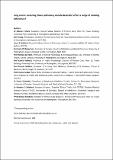Files in this item
Lung cancer screening : does pulmonary nodule detection affect a range of smoking behaviours?
Item metadata
| dc.contributor.author | Clark, Marcia E. | |
| dc.contributor.author | Young, Ben | |
| dc.contributor.author | Bedford, Laura E. | |
| dc.contributor.author | das Nair, Roshan | |
| dc.contributor.author | Robertson, John F. R. | |
| dc.contributor.author | Vedhara, Kavita | |
| dc.contributor.author | Sullivan, Francis | |
| dc.contributor.author | Mair, Frances S. | |
| dc.contributor.author | Schembri, Stuart | |
| dc.contributor.author | Littleford, Roberta C. | |
| dc.contributor.author | Kendrick, Denise | |
| dc.date.accessioned | 2019-09-28T23:37:33Z | |
| dc.date.available | 2019-09-28T23:37:33Z | |
| dc.date.issued | 2019-09 | |
| dc.identifier | 256072133 | |
| dc.identifier | a9056b41-4dfe-43e3-a0a9-984722b568cf | |
| dc.identifier | 30272192 | |
| dc.identifier | 000493564400031 | |
| dc.identifier | 85073058459 | |
| dc.identifier.citation | Clark , M E , Young , B , Bedford , L E , das Nair , R , Robertson , J F R , Vedhara , K , Sullivan , F , Mair , F S , Schembri , S , Littleford , R C & Kendrick , D 2019 , ' Lung cancer screening : does pulmonary nodule detection affect a range of smoking behaviours? ' , Journal of Public Health , vol. 41 , no. 3 , pp. 600–608 . https://doi.org/10.1093/pubmed/fdy158 | en |
| dc.identifier.issn | 0943-1853 | |
| dc.identifier.other | ORCID: /0000-0002-6623-4964/work/49052234 | |
| dc.identifier.uri | https://hdl.handle.net/10023/18577 | |
| dc.description | This work was supported by a National Institute for Health Research School for Primary Care Research funded academic clinical fellowship. | en |
| dc.description.abstract | Background: Lung cancer screening can reduce lung cancer mortality by 20%. Screen-detected abnormalities may provide teachable moments for smoking cessation. This study assesses impact of pulmonary nodule detection on smoking behaviours within the first UK trial of a novel auto-antibody test, followed by chest x-ray and serial CT scanning for early detection of lung cancer (Early Cancer Detection Test–Lung Cancer Scotland Study). Methods: Test-positive participants completed questionnaires on smoking behaviours at baseline, 1, 3 and 6 months. Logistic regression compared outcomes between nodule (n = 95) and normal CT groups (n = 174) at 3 and 6 months follow-up. Results: No significant differences were found between the nodule and normal CT groups for any smoking behaviours and odds ratios comparing the nodule and normal CT groups did not vary significantly between 3 and 6 months. There was some evidence the nodule group were more likely to report significant others wanted them to stop smoking than the normal CT group (OR across 3- and 6-month time points: 3.04, 95% CI: 0.95, 9.73; P = 0.06). Conclusion: Pulmonary nodule detection during lung cancer screening has little impact on smoking behaviours. Further work should explore whether lung cancer screening can impact on perceived social pressure and promote smoking cessation. | |
| dc.format.extent | 9 | |
| dc.format.extent | 873365 | |
| dc.language.iso | eng | |
| dc.relation.ispartof | Journal of Public Health | en |
| dc.subject | Lung cancer screening | en |
| dc.subject | Pulmonary nodules | en |
| dc.subject | Smoking behaviour | en |
| dc.subject | RC0254 Neoplasms. Tumors. Oncology (including Cancer) | en |
| dc.subject | NDAS | en |
| dc.subject | SDG 3 - Good Health and Well-being | en |
| dc.subject.lcc | RC0254 | en |
| dc.title | Lung cancer screening : does pulmonary nodule detection affect a range of smoking behaviours? | en |
| dc.type | Journal article | en |
| dc.contributor.institution | University of St Andrews. Population and Behavioural Science Division | en |
| dc.contributor.institution | University of St Andrews. School of Medicine | en |
| dc.identifier.doi | https://doi.org/10.1093/pubmed/fdy158 | |
| dc.description.status | Peer reviewed | en |
| dc.date.embargoedUntil | 2019-09-29 |
This item appears in the following Collection(s)
Items in the St Andrews Research Repository are protected by copyright, with all rights reserved, unless otherwise indicated.

